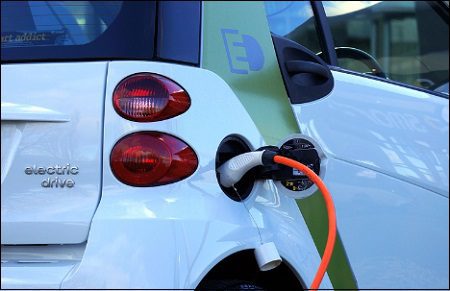Sweden-based Volvo Cars announced that starting in 2019 it will only manufacture vehicles that are either all-electric or hybrids, making it the first mainstream automaker to phase out models that operate just with traditional gasoline- or diesel-powered internal combustion engines.
That will also make it the first among traditional automakers to offer a line that would provide little revenue into the U.S. Highway Trust Fund, as it is currently designed. And such developments could add to pressure for Congress to find ways to shore up the trust fund in any infrastructure investment plan or tax reform that lawmakers consider.
The non-traditional, electric-powered part of the market is growing. Already, Tesla has built a strong following for its stylish all-electric car models, while other carmakers are offering more hybrids and all-electric models. And Tesla has said it will begin delivering this month the first units of a more affordable model that is aimed at the mass market rather than the luxury car segment.
The trust fund depends on an array of excise taxes – principally on gasoline and diesel, but including levies on natural gas fuels and heavy truck equipment. It does not include any fees on all-electric vehicles, as some states have begun to assess, and it only captures a small percentage of revenue from hybrids that use an oil-based fuel to start and for some operations but which generate electric power for much of the drive.
The moves by Volvo, Tesla and others do not immediately threaten the HTF’s main motor-fuel tax revenue stream, since electrics and hybrids continue to make up a small part of the total U.S. vehicle fleet. But the rapid adoption of such models adds to the growing pressure on the trust fund, which has already seen its average per-mile revenue slide as customers buy higher-efficiency vehicles that get more miles per gallon.
Some transportation investment stakeholders have warned that the spread of high-efficiency models and the growing acceptance of hybrids or all-electric vehicles means the United States will need to consider new revenue-generating concepts such as mileage-based road user charges in order to pay for transportation infrastructure.
Volvo Cars, which is owned by China’s Geely Holding, said that “every Volvo it launches from 2019 will have an electric motor, marking the historic end of cars that only have an internal combustion engine and placing electrification at the core of its future business.”
The company said it will introduce “a portfolio of electrified cars across its model range, embracing fully electric cars, plug-in hybrid cars and mild hybrid cars.”
That includes “five fully electric cars between 2019 and 2021, three of which will be Volvo models and two of which will be high-performance electrified cars from Polestar, Volvo Cars’ performance car arm.” These five models will be supplemented by a number of hybrid models, it added.
“This announcement marks the end of the solely combustion engine-powered car,” said CEO Håkan Samuelsson. He added that Volvo Cars has said it plans to have sold a total of one million electrified cars by 2025. “When we said it we meant it. This is how we are going to do it.”
The Wall Street Journal reported that Volvo’s action, along with plans by Toyota, Volkswagen and Daimler to move into electric cars, indicate “that the auto industry believes the internal combustion engine’s days are numbered.”
The New York Times noted that all-electric carmaker Tesla passed both Ford and General Motors this year in stock market value, “despite making significantly fewer cars than those automotive giants – a clear indication of where investors think the industry is headed.”


